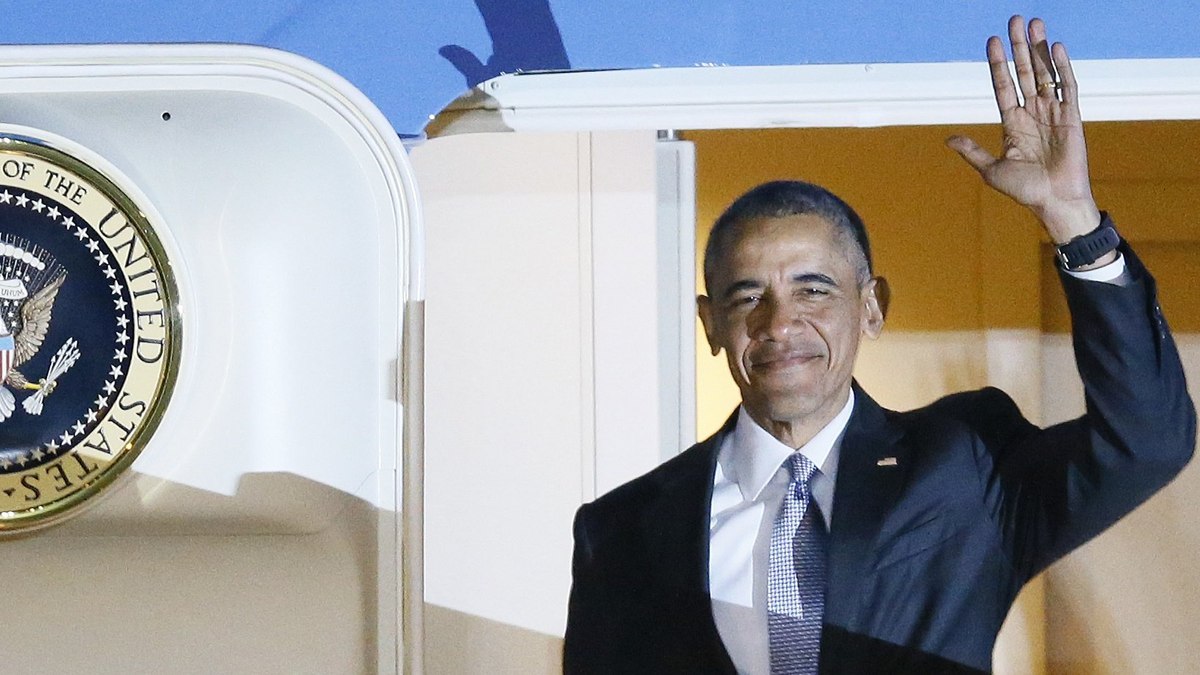President Obama has flown into Britain to wish the Queen a happy birthday.
But he has also plunged straight into the centre of the Europe referendum battle by making a spirited case for Britain remaining in the European Union. David Cameron hopes this will help swing the vote in favour, but the ‘Leave’ campaign is very cross about it. It is no business of an American president to poke his nose in other countries’ democratic affairs, they say, and anyway his case is hypocritical and self-serving. So is Mr Obama’s intervention justified or not?
The White House has made no secret of the President’s wish to help his friend, David Cameron, as he battles to persuade the British people to follow his lead in the referendum. But few were expecting Mr Obama to be quite so forthright. In an article in Friday’s Daily Telegraph, he touched his forelock to the democratic principle that it is of course for the British people, and them alone, to make the decision, but he then went on ‘with the candour of a friend’ to tell us how he thought we should vote.
He wrote: ‘As citizens of the United Kingdom take stock of their relationship with the EU, you should be proud that the EU has helped spread British values and practices – democracy, the rule of law, open markets – across the continent and to its periphery. The European Union doesn’t moderate British influence – it magnifies it. A strong Europe is not a threat to Britain’s global leadership; it enhances Britain’s global leadership. The United States sees how your powerful voice in Europe ensures that Europe takes a strong stance in the world, and keeps the EU open, outward-looking and closely linked to its allies on the other side of the Atlantic. So the US and the world need your outsized influence to continue – including within Europe.’
Those campaigning for Britain to leave the EU have taken exception to this intervention on several grounds. At the most fundamental level they argue that it is simply none of the American president’s business to embroil himself in the domestic political battles of another country, however close an ally it might be. The Labour MP, Kate Hoey, a long-standing opponent of British membership of the EU, said: ‘We would certainly never think of visiting the United States and telling the US public how to vote in an election or the amendment of their constitution’.
But in his article, the President implicitly justified his intervention by writing: ‘The tens of thousands of Americans who rest in Europe’s cemeteries are a silent testament to just how intertwined our prosperity and security truly are. And the path you choose now will echo in the prospects of today’s generation of Americans as well.’
As well as being challenged on the fundamental legitimacy of expressing his opinion, Mr Obama has also been charged with hypocrisy. The mayor of London, Boris Johnson – a last-minute recruit to the campaign to leave the EU – wrote in the Sun on the same day as the president’s article: ‘For the United States to tell us in the UK that we must surrender control of so much of our democracy is a breath-taking example of the principle of do as I say, not as I do. It is incoherent. It is inconsistent, and yes it is downright hypocritical.’
Mr Johnson’s argument is that the unacceptable price of British membership of the EU is the loss of sovereignty in taking decisions that affect us and that the United States would not dream of sacrificing its own sovereignty in the same way. As other supporters of Brexit put it, the United States would never allow itself to join, say, an American Union in which it could be outvoted by a group of south American countries, so it is hypocritical for a US president to urge Britain to do just that in a European context.
Defenders of Mr Obama argue that even though it may be true that the USA wouldn’t join an American Union, that’s because such an idea isn’t on anyone’s table. But the United States is prepared to ‘share’ its sovereignty when it seems in its interests to do so. American membership of the United Nations, or of NATO is cited as example; so too is its willingness to sign up to the Climate Change deal being finalised in Paris this week. The President, they argue, is simply saying that in this case it is in Britain’s interests to share its sovereignty just as in other cases it is in America’s.
But that is itself disputed. Obama’s say his advice is coloured much less by what may be in Britain’s interests and much more by what he thinks is in America’s. They argue that the United States wants Britain to stay in the EU because it regards Britain as a reliable advocate of the American case within the European Union. With its so-called ‘special relationship’ with the USA, Britain is less likely to go along with policies, whether in terms of open trade or security, that Washington would not want. On this view, Britain is America’s ‘useful fool’ within the EU and the US wants it to stay there.
This too, of course, is disputed by those who think Mr Obama is simply trying to give candid, dispassionate advice to British voters. Certainly the USA has its own interests in keeping Britain in the EU but it is not dependent on the UK’s membership of the EU for getting its voice heard. Despite all the continuing talk of the special relationship, it is almost certainly the case that there is now a stronger tie between Washington and Berlin than there is between Washington and London. The United States has other ways of protecting its interests in Europe. Mr Obama is off to see Angela Merkel after he has had his lunch with the Queen.
So what are we to make of all this? Was Mr Obama right to intervene at all? And, since he did, was what he has said hypocritical and self-serving? Or was he genuinely trying to give us advice ‘with the candour of a friend’? And how significant is his intervention likely to be? Will it have influenced the way you vote?









